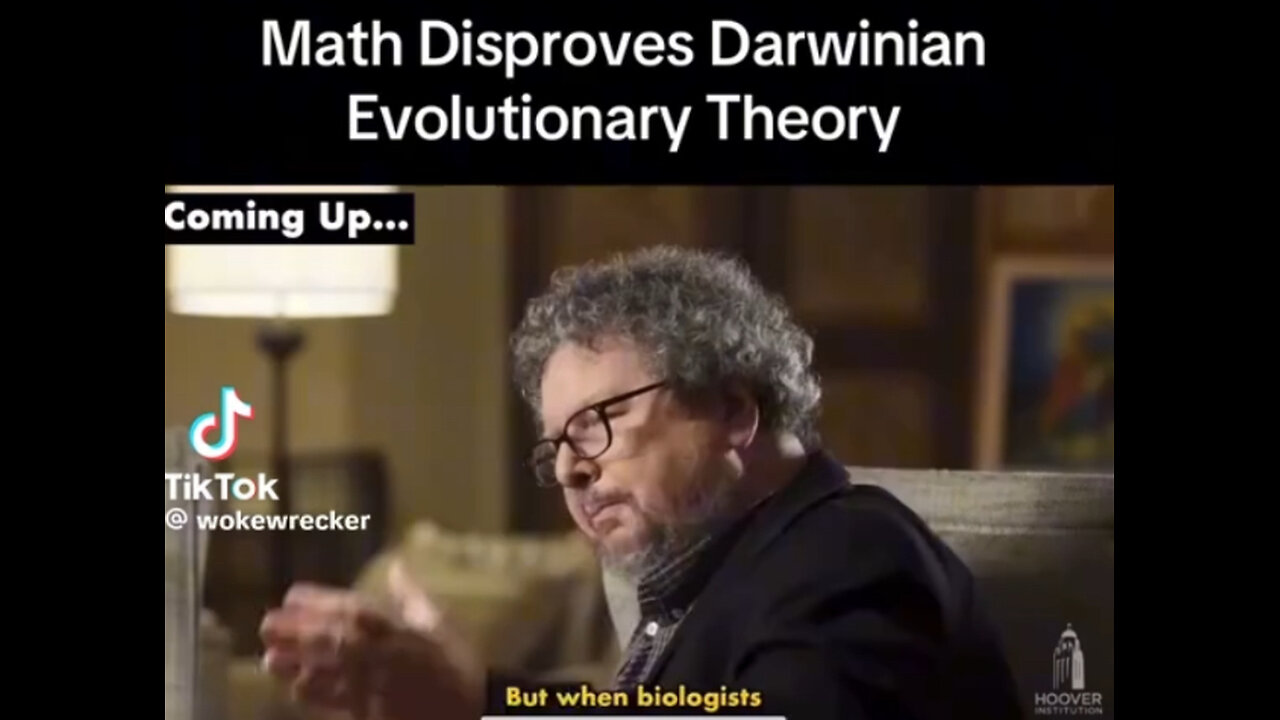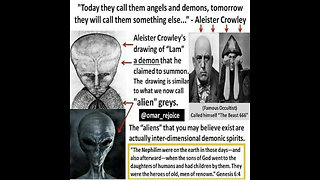Premium Only Content

Intelligent Design: A Scientific Exploration or Theology in Disguise?
The debate surrounding intelligent design (ID) challenges the core principles of Darwinian evolution, questioning whether the vast complexity of life could arise solely through natural selection and random mutations. As we delve into this conversation, particularly through the lens of leading thinkers like David Berlinski, Steven Meyer, and David Galerner, we encounter profound questions about the origin of biological information, the limits of evolutionary mechanisms, and the nature of intelligence itself.
This article aims to unpack the core arguments, evaluate the statistical challenges to Darwinism, and consider whether intelligent design constitutes a valid scientific framework or a veiled theological assertion.
1. The Challenge to Darwinian Evolution
The Statistical Improbability of Functional Proteins
One of the critical issues raised by skeptics of Darwinism is the staggering improbability of random mutations producing functional proteins. Proteins are complex chains of amino acids that must fold into precise shapes to perform biological functions. According to the arguments presented:
• The ratio of functional to non-functional protein sequences is 1 in 10^77.
• Even if every organism that has ever existed—estimated at 10^40—produced mutations, the total number of mutations would only explore a tiny fraction of the potential sequence space.
This suggests that the probability of stumbling upon a functional protein sequence by chance is astronomically low, leading to the conclusion that there hasn’t been enough time or opportunities for natural selection to account for the complexity we observe in life.
Early vs. Late Mutations
Mutations that occur late in an organism’s development often have little impact because the body plan is already established. On the other hand, mutations that occur early can disrupt foundational processes, typically resulting in non-viable organisms. This creates a dilemma:
• Late mutations: Ineffective for producing significant evolutionary changes.
• Early mutations: Likely to be fatal.
This “destructive dilemma” undermines the plausibility of Darwinian mechanisms generating entirely new body plans or major evolutionary leaps.
2. The Argument for Intelligent Design
The Information Problem
Intelligent design proponents argue that the discovery of DNA as an information storage system fundamentally changes the conversation. DNA operates like a digital code, where the sequence of nucleotides dictates biological functions. This raises a critical question:
• Where does the information encoded in DNA originate?
Steven Meyer contends that all known examples of complex, specified information (e.g., hieroglyphics, computer code, written language) trace back to an intelligent source. By analogy, the information in DNA points to a directing mind rather than unguided natural processes.
The Genetic Code and Symbolic Language
Francis Crick, a co-discoverer of DNA’s structure, recognized that the genetic code operates independently of the chemical properties of its components. The arrangement of nucleotides follows an abstract symbolic logic, much like a language or computer program. This independence from material properties suggests an intentional design rather than random assembly.
3. Statistical Analysis and the Limits of Natural Selection
The Search Space Problem
Evolutionary processes can be viewed as a search through an astronomical number of possible configurations:
• The total “search space” for viable biological systems is vastly larger than the number of opportunities life has had to explore it.
• Even under optimistic assumptions, natural selection cannot traverse the vast majority of this space.
This argument is often illustrated with the analogy of monkeys typing on typewriters:
• If a million monkeys typed randomly, the chance of producing the complete works of Shakespeare in a reasonable timeframe is negligible. Similarly, the odds of randomly generating functional biological systems are overwhelmingly against Darwinian processes.
Failure of Undirected Mechanisms
In his books Darwin’s Doubt and Signature in the Cell, Meyer demonstrates that:
• Evolutionary mechanisms, such as mutation and natural selection, fail to account for the origin of the information required to produce new biological forms.
• Without a plausible explanation for this information, the materialistic framework of evolution remains incomplete.
4. Intelligent Design: Science or Theology?
A Scientific Framework
Proponents of ID assert that their approach is scientific, relying on empirical evidence and logical inference rather than theological assumptions. The core claims of ID include:
• Empirical Basis: Life exhibits complex, specified information that cannot arise from undirected processes.
• Inference to the Best Explanation: Intelligence is the only known source of such information, making it the most plausible explanation for life’s origins.
Criticism of ID
Skeptics argue that intelligent design:
• Implicates a Creator: By invoking a “designing mind,” ID risks introducing theological elements, blurring the line between science and religion.
• Lacks Predictive Power: Critics claim that ID does not offer testable predictions or mechanisms, which are hallmarks of scientific theories.
Defending ID as Non-Theological
Berlinski and Meyer emphasize that intelligent design does not identify the designer. Instead, it focuses on the empirical detection of design in nature. This distinction separates ID from religious creationism, framing it as a scientific inquiry into the origins of biological information.
5. Counterarguments and Open Questions
Evolution’s Creative Power
Evolutionary biologists argue that:
• Natural selection, acting over billions of years, provides sufficient opportunities for rare beneficial mutations to accumulate.
• Evidence from fossil records, genetic studies, and observed adaptations supports the creative power of evolutionary mechanisms.
The Designer’s Identity
If intelligent design is correct, the question arises: Who or what is the designer?
• ID deliberately avoids addressing this question, focusing solely on evidence for design.
• Critics argue that leaving the designer undefined weakens the explanatory power of the theory.
6. The Role of Science in Testing Ideas
David Galerner highlights the importance of science as a process of testing and refining ideas. Darwin’s theory, though groundbreaking, is not immune to revision or replacement. The challenge is to rigorously evaluate alternative explanations, including intelligent design, without dismissing them prematurely.
7. Conclusion: Toward a Broader Understanding
The debate over intelligent design and Darwinian evolution centers on profound questions about the nature of life, the origins of complexity, and the mechanisms driving change. Intelligent design challenges the sufficiency of undirected evolutionary processes, arguing that life’s intricate information systems point to a guiding intelligence. While critics view ID as a veiled theological argument, proponents insist it is a scientific framework grounded in observable phenomena.
Ultimately, the conversation about life’s origins demands open-minded exploration, rigorous analysis, and a willingness to confront the limits of current paradigms. Whether intelligent design will emerge as a transformative scientific theory or remain a contentious idea depends on its ability to withstand scrutiny and offer compelling, testable insights into the mysteries of life.
-
 5:05
5:05
FragmentsOfTruth
5 days agoThe Old Ones in the Music Industry: Channeling Spirits for Fame?
334 -
 1:36:19
1:36:19
Flyover Conservatives
16 hours agoOnly 17% of Millennials Hit These 5 Adult Milestones—Why?; What If Childhood Trauma Is Behind Your Health Problems? - Dr. Troy Spurrill | FOC Show
37.1K4 -
 4:49:04
4:49:04
HogansAlleyHero
17 hours ago💥CHASING DOPAMINE💥✅TRUMP SAYS BATTLEFIELD IS THE BEST✅
47.7K3 -
 1:57:40
1:57:40
MattMorseTV
8 hours ago $12.55 earned🔴Trump just SHATTERED the PROJECTIONS.🔴
58.4K50 -
 2:32:19
2:32:19
megimu32
7 hours agoOTS: From Star Search to Superstardom
41.5K4 -
 1:56:21
1:56:21
Joker Effect
5 hours agoInterviewing GREENMAN! Looks like he is coming to Rumble! Let's give him a warm welcome! REAL TALENT
25.6K1 -
 1:07:21
1:07:21
Anthony Rogers
13 hours agoEpisode 380 - Is Pain All In Your Head?
18K3 -
 1:46:17
1:46:17
Glenn Greenwald
10 hours agoGlenn Takes Your Questions on Censorship, Epstein, and More; DNC Rejects Embargo of Weapons to Israel with Journalist Dave Weigel | SYSTEM UPDATE #505
119K8 -
 3:26:34
3:26:34
Jokeuhl Gaming and Chat
12 hours agoHelldivers 2 - Spreading Democracy w/ Ryker
14K1 -
 27:47
27:47
Stephen Gardner
7 hours ago🚨BREAKING: Trump FURIOUS Over Kamala’s Latest Move – SHOCKING Details!
19.5K83